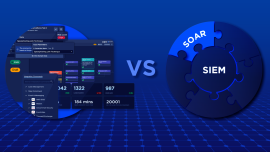
If you have ever been exposed to the world of software and application development, many people are probably familiar with the concept of DevOps. However, a new approach to risk management, bringing technical innovation and revolutionary activity to cybersecurity is DevSecOps – the intersection of DevOps and Security. In this article, we’ll look at what DevSecOps is and how it can help you and your organization.
What is DevSecOps?
As we all know, DevOps is a set of methodologies and tools that combine software/application development (Dev) with information technology (IT) activities (Ops). DevOps enhances the ability to deploy applications and services faster, while giving many advantages to any company that wants to remain competitive. As a result, DevOps has quickly become the standard in application development, and many organizations have adopted this model. Advances in the IT industry, including cloud computing, shared resources, and flexible provisioning, have made DevOps an accessible and attractive method to apply to organizations.
DevSecOps stands for Development, Security, and Operations. This is an extension of the DevOps approach. This method provides a comprehensive way to secure the application right in the development process, they are integrated with the devops pipeline that uses automated tools to control the information security of the application under construction before delivering it to the end user.
DevSecOps extends the DevOps mindset, a philosophy that integrates security practices into every stage of DevOps. The DevSecOps methodology creates a ‘Security as code’ culture that allows application publishing engineers to flexibly collaborate with corporate security teams and enhance communication and shared responsibility.

Why is DevSecops important?
DevSecOps processes enable organizations to deliver innovative products quickly while maintaining security. The emergence of continuous software development practices allows potential security issues to be identified during development rather than after a product has been released.
In the last few years, a number of fundamental changes have necessitated the acceleration of DevSecOps requirements.
Advanced technology: Over the past two decades, technology infrastructure has undergone digital transformation. There have been tremendous improvements in speed and cost due to the shift to cloud, shared resources, and dynamic provisioning. All this has greatly improved the ability to develop applications. As a result, mission-critical application launches are becoming less common, which has led to a shift to DevOps and agile techniques.
Speed of development: In the past, security concerns were delayed until the end of projects. A project can take months or even years to complete, so security is not an issue. With that amount of time, teams of security experts are enough to analyze the application and address the vulnerabilities thoroughly. The speed and frequency of development cycles also vary significantly. We’re just talking about a few days or weeks per repetition. Unfortunately, security and compliance monitoring systems are not designed to keep up with the rapid pace of change required by DevOps. As a result, a security crisis threatens if models are not updated.
The application security processes used in DevSecOps are integrated into the entire build process from the very beginning of the process. A security-based strategy allows DevSecOps developers to ensure that applications are secured before releasing them to end users.
Benefits of using DevSecOps service of VNCS Global
Early detection of software vulnerabilities
When integrating VNCS Global’s DevSecOps service, the detection of security flaws and vulnerabilities of the application is developing very quickly through specialized tools integrated and continuously scanned, helping teams to patch vulnerabilities immediately without having to wait for the end of the product’s development lifecycle.
Shorten time to market
Thanks to DevSecOps, software teams can automate the security testing process and reduce human error. This also prevents security assessments from being bottlenecked in the development process.
Ensure regulatory compliance
When integrating the DevSecOps process, the development team (developer), operation team (operation) must strictly follow the process to ensure that the developing application is free from security errors, protecting sensitive data such as database, secrect key, token,…. against data leak
Build a security-conscious culture
Software teams are more aware of security best practices when developing applications. They will be more proactive in detecting potential security issues in code, modules, libraries or other technology used to build applications.
Develop new features securely
DevSecOps encourages flexible collaboration between development, operations, and security teams. They have the same knowledge of software security and use common tools to automate assessments and reporting. Everyone is focused on ways that add value to customers without compromising security.
Organizations need to leverage the DevSecOps approach with the right security service provider to accelerate development, achieve security goals, enhance the test cycle, and deliver quality products and services. Customers can refer to more information about DevSecOps service of VNCS Global: HERE



